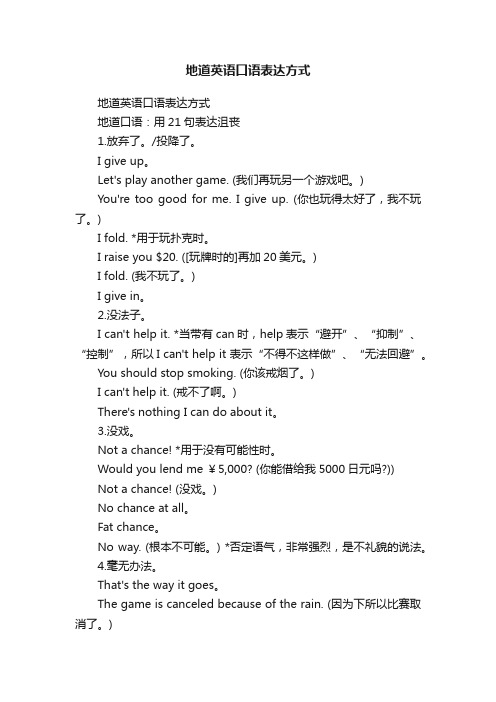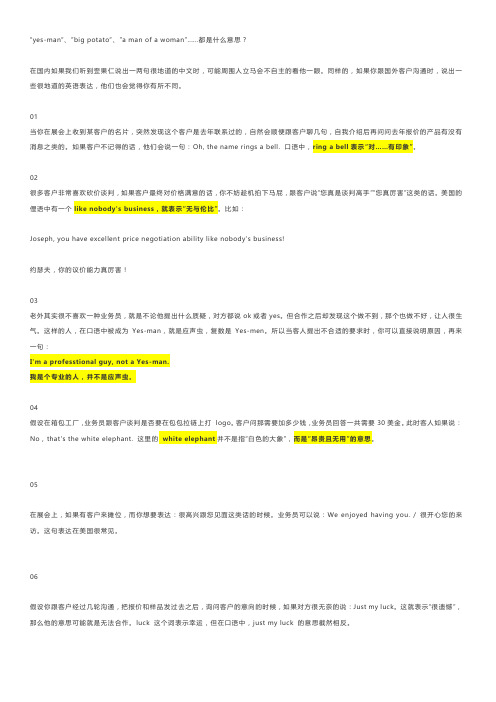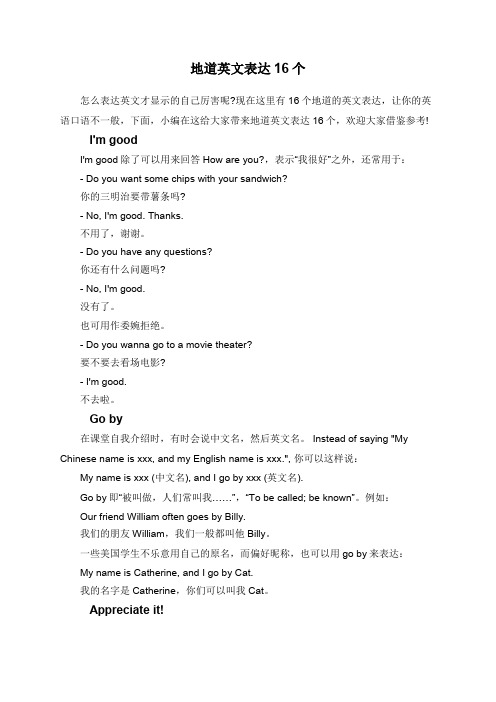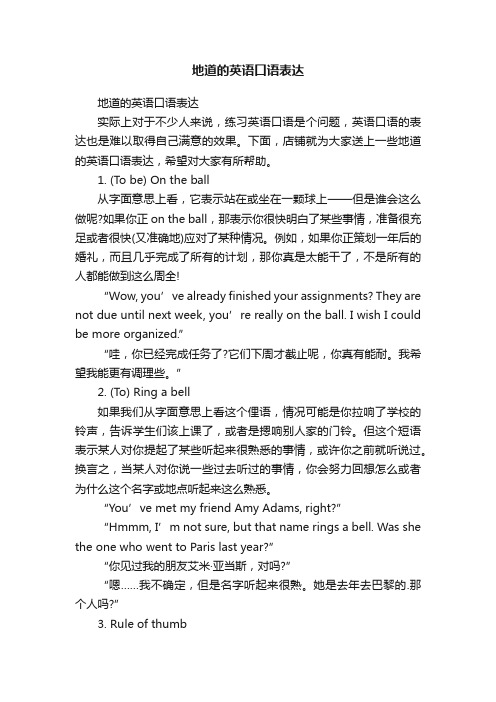最地道的英语表达
地道英语口语表达方式

地道英语口语表达方式地道英语口语表达方式地道口语:用21句表达沮丧1.放弃了。
/投降了。
I give up。
Let's play another game. (我们再玩另一个游戏吧。
)You're too good for me. I give up. (你也玩得太好了,我不玩了。
)I fold. *用于玩扑克时。
I raise you $20. ([玩牌时的]再加20美元。
)I fold. (我不玩了。
)I give in。
2.没法子。
I can't help it. *当带有can时,help表示“避开”、“抑制”、“控制”,所以I can't help it 表示“不得不这样做”、“无法回避”。
You should stop smoking. (你该戒烟了。
)I can't help it. (戒不了啊。
)There's nothing I can do about it。
3.没戏。
Not a chance! *用于没有可能性时。
Would you lend me ¥5,000? (你能借给我5000日元吗?))Not a chance! (没戏。
)No chance at all。
Fat chance。
No way. (根本不可能。
) *否定语气,非常强烈,是不礼貌的说法。
4.毫无办法。
That's the way it goes。
The game is canceled because of the rain. (因为下所以比赛取消了。
)That's the way it goes. (没办法呀。
)5.毫无线索。
I have no clue. *clue 表示“线索”、“头绪”。
Do you know who stole it? (你知道是谁偷的吗?)I have no clue. (毫无线索。
)I don't have any idea。
地道英语口语

英语,作为全球通用语言,对于许多人来说,不仅仅是一种沟通工具,更是一种生活方式。
在追求流利、地道的英语口语表达过程中,掌握一些常用的地道表达显得尤为重要。
本文将为你呈现900句地道英语口语,帮助你在各种场合自信地表达自己。
一、日常问候与告别Hi there, how’s it going? 嗨,最近怎么样?What’s up, buddy? 哥们,怎么了?Goodbye and take care. 再见,保重。
二、表达感谢与回应Thanks a million. 非常感谢。
You’re welcome. 不用谢。
Appreciate it. 感激不尽。
三、提出建议与意见You should try it. 你应该试试。
Why don’t you give it a shot? 你为什么不尝试一下呢?In my opinion, it’s worth a try. 在我看来,值得一试。
四、表达喜好与兴趣I’m really into music. 我很喜欢音乐。
I love nothing more than reading. 我最喜欢的就是阅读。
I’m crazy about sports. 我对运动非常着迷。
五、谈论工作与学习How’s work been? 工作怎么样?I’m still studying hard. 我还在努力学习。
The project is coming together nicely. 项目进展得很顺利。
六、描述人物与外貌She’s got a great sense of humor. 她很有幽默感。
He’s always dressed to the nines. 他总是穿着很讲究。
She has the prettiest smile I’ve ever seen. 她有我见过的最美的笑容。
七、谈论食物与餐饮This dish is delicious. 这道菜很好吃。
40个地道的英语表达方式,与买家沟通更顺畅!

“yes-man“、”big potato“、”a man of a woman”......都是什么意思?在国内如果我们听到歪果仁说出一两句很地道的中文时,可能周围人立马会不自主的看他一眼。
同样的,如果你跟国外客户沟通时,说出一些很地道的英语表达,他们也会觉得你有所不同。
01当你在展会上收到某客户的名片,突然发现这个客户是去年联系过的,自然会顺便跟客户聊几句,自我介绍后再问问去年报价的产品有没有消息之类的。
如果客户不记得的话,他们会说一句:Oh, the name rings a bell. 口语中,ring a bell表示“对……有印象”。
02很多客户非常喜欢砍价谈判,如果客户最终对价格满意的话,你不妨趁机拍下马屁,跟客户说“您真是谈判高手”“您真厉害”这类的话。
美国的俚语中有一个like nobody's business,就表示“无与伦比”。
比如:Joseph, you have excellent price negotiation ability like nobody's business!约瑟夫,你的议价能力真厉害!03老外其实很不喜欢一种业务员,就是不论他提出什么质疑,对方都说ok或者yes。
但合作之后却发现这个做不到,那个也做不好,让人很生气。
这样的人,在口语中被成为Yes-man,就是应声虫,复数是Yes-men。
所以当客人提出不合适的要求时,你可以直接说明原因,再来一句:I'm a professtional guy, not a Yes-man.我是个专业的人,并不是应声虫。
04假设在箱包工厂,业务员跟客户谈判是否要在包包拉链上打logo。
客户问那需要加多少钱,业务员回答一共需要30美金。
此时客人如果说:No,that's the white elephant. 这里的white elephant并不是指“白色的大象”,而是“昂贵且无用”的意思。
地道英文表达16个

地道英文表达16个怎么表达英文才显示的自己厉害呢?现在这里有16个地道的英文表达,让你的英语口语不一般,下面,小编在这给大家带来地道英文表达16个,欢迎大家借鉴参考!I'm goodI'm good除了可以用来回答How are you?,表示“我很好”之外,还常用于:- Do you want some chips with your sandwich?你的三明治要带薯条吗?- No, I'm good. Thanks.不用了,谢谢。
- Do you have any questions?你还有什么问题吗?- No, I'm good.没有了。
也可用作委婉拒绝。
- Do you wanna go to a movie theater?要不要去看场电影?- I'm good.不去啦。
Go by在课堂自我介绍时,有时会说中文名,然后英文名。
Instead of saying "My Chinese name is xxx, and my English name is xxx.", 你可以这样说:My name is xxx (中文名), and I go by xxx (英文名).Go by即“被叫做,人们常叫我……”,“To be called; be known”。
例如:Our friend William often goes by Billy.我们的朋友William,我们一般都叫他Billy。
一些美国学生不乐意用自己的原名,而偏好昵称,也可以用go by来表达:My name is Catherine, and I go by Cat.我的名字是Catherine,你们可以叫我Cat。
Appreciate it!在美国,每次下公交车的时候,大家都会礼貌地对司机表示感谢,有次看到四个小哥鱼贯而出,每个人表达感谢的语句都不同。
除了常见的"Thank you very much!","Thanks a lot!"以外,就是“Appreciate it!"Appreciate it,完整意思就是:I appreciate what you have done for me.我非常感谢你为我做的事。
地道英式英语表达32个

地道英式英语表达32个导语:随着英国脱欧,选择和购物成了最好的时机,那么,多掌握一些英国人的日常表达,对于或者购物还是很有帮助的。
下面是收集的32个地道英式英语表达,欢迎参考!1、“Can I get a…”英国人吐槽:当某些人想要什么东西时,我经常听到他们说:“Can I get a…(我能要一个……)”这让我大为恼火。
这里又不是纽约,又不是90年代,你以为你是在Central Perk里演《老友记》啊,真是的!英式表达:Please can I have/ I’d like to order the…2、“least worst option”英国人吐槽:下次要是有人跟你讲XXX是the “least worst option”(最好选择),你就告诉他们对于他们来说最最最好的选择是滚回去学语法。
英式表达:The lesser of two evils/the better of the two eg:I think going with him is the better of twoevils/is the better of the two options.3、”two-time” and “three-time”英国人吐槽:我经历过的渐渐渗入到英语里的短语(特别是播音员使用的)是“two-time(两次)”和“three-time(三次)”。
难道double啊triple啊什么的都彻底消失了么?从语法上来说,这根本构不成短语,而且用在口语中更糟糕。
每次听到或者看到它我就心跳加速。
这对我的安康造成了威胁,因为根本每天都要经历这些。
我去!英式表达:double,triple,quadruple,quintupleEg:a double ourrence (not a two-time ourrence)4、24/7英国人吐槽:使用24/7来表达“全天候”,不如就朴实地说“all day, every day”。
英语地道口语表达

英语地道口语表达以下是一些地道的英语口语表达方式,涵盖了不同场景:1. 日常问候- Hey, how's it going?(嘿,最近怎么样?)- What's up?(有什么新鲜事吗?)- Good morning!(早上好!)- Good afternoon!(下午好!)- Good evening!(晚上好!)2. 表达感谢- Thanks a lot!(非常感谢!)- Appreciate it!(感激不尽!)- Many thanks!(多谢!)3. 道歉- I'm sorry for the inconvenience.(很抱歉造成不便。
)- Excuse me.(打扰一下。
)- Please forgive me.(请原谅我。
)4. 请求帮助- Could you help me out?(你能帮我个忙吗?)- I need some assistance.(我需要一些帮助。
)- Is there anyone who can give me a hand?(有人能帮我一下吗?)5. 谈论天气- It's a beautiful day, isn't it?(今天天气真好,不是吗?)- The weather is terrible today.(今天天气真糟糕。
)- It looks like it's going to rain.(看起来要下雨了。
)6. 在餐馆- Could I please have the menu?(我可以看一下菜单吗?)- I'll have the chicken salad, please.(请给我来份鸡肉沙拉。
) - Check, please.(请结账。
)7. 告别- It was great seeing you!(很高兴见到你!)- I'll talk to you later.(回头再聊。
英语口语地道表达

You look stunning. 你太美了。
I miss you. 我想你。
You had me at “hello”. 我对你一见钟情。
I missed you. 我错过你了。
(你看,时态一变,意思大不一样)Love at first sight. 一见钟情(I believe in love at first sight. -我相信一见钟情)Are you hitting on me? 你是在对我放电吗?You are my priority. 你是我的一生挚爱。
I wanna be with you. 我想和你在一起。
You complete me. 有你我才完整。
What is done is done. 覆水难收。
Never mind. 算了。
I am so sick of this. 我受够了。
I loved you.我爱过你。
Let bygones be bygones.往事不重提。
Force of habit. 习惯了。
Farewell. 再见(永别)Long time no see. 好久不见。
woulda coulda shoulda早知如此,何必当初频率篇I always go fishing.I usually go fishing.I seldom go fishing.I never go fishing.表示频率的词叫做频率副词,什么是副词?副词表示在句子中表示行为或者状态特征的词,用来修饰动词、形容词、其他副词(没错还可以两个副词连起来使用)、介词短语、甚至全句!表示时间、地点、方式等概念。
频率副词怎么区分?always 总是100%usually 通常80%often 经常60%sometimes 有时候40%seldom 几乎不10%never 从不0%所以,霉霉的歌曲we were never ever getting back toghter 就是我们永远回不去的意思啦。
地道的英语口语表达

地道的英语口语表达地道的英语口语表达实际上对于不少人来说,练习英语口语是个问题,英语口语的表达也是难以取得自己满意的效果。
下面,店铺就为大家送上一些地道的英语口语表达,希望对大家有所帮助。
1. (To be) On the ball从字面意思上看,它表示站在或坐在一颗球上——但是谁会这么做呢?如果你正on the ball,那表示你很快明白了某些事情,准备很充足或者很快(又准确地)应对了某种情况。
例如,如果你正策划一年后的婚礼,而且几乎完成了所有的计划,那你真是太能干了,不是所有的人都能做到这么周全!“Wow, you’ve already finished your assignments? They are not due until next week, you’re really on the ball. I wish I could be more organized.”“哇,你已经完成任务了?它们下周才截止呢,你真有能耐。
我希望我能更有调理些。
”2. (To) Ring a bell如果我们从字面意思上看这个俚语,情况可能是你拉响了学校的铃声,告诉学生们该上课了,或者是摁响别人家的门铃。
但这个短语表示某人对你提起了某些听起来很熟悉的事情,或许你之前就听说过。
换言之,当某人对你说一些过去听过的事情,你会努力回想怎么或者为什么这个名字或地点听起来这么熟悉。
“You’ve met my friend Amy Adams, right?”“Hmmm, I’m not sure, but that name ri ngs a bell. Was she the one who went to Paris last year?”“你见过我的朋友艾米·亚当斯,对吗?”“嗯……我不确定,但是名字听起来很熟。
她是去年去巴黎的.那个人吗?”3. Rule of thumb拇指可以统治吗或者你能从字面意思上去统治一根拇指吗?如果从逻辑上来考虑,这是完全讲不通的。
- 1、下载文档前请自行甄别文档内容的完整性,平台不提供额外的编辑、内容补充、找答案等附加服务。
- 2、"仅部分预览"的文档,不可在线预览部分如存在完整性等问题,可反馈申请退款(可完整预览的文档不适用该条件!)。
- 3、如文档侵犯您的权益,请联系客服反馈,我们会尽快为您处理(人工客服工作时间:9:00-18:30)。
1. XYZ 检查你的拉链
Hey, man. XYZ. 老兄啊!检查一下你的拉链吧。
"XYZ" 是"Check your zipper." 的意思。
美国填表中的选项多用打"X"来表示。
这个选项的动作就叫"Check",也就是XYZ 中的X。
Y 代表Your,Z代表Zipper 。
2. kiss ass 拍马屁(来源:英语麦当劳-英语学习门户)
A: Mary, I'm sorry for cheating on you before. Do you see any chance that we can get back together? Mary,我真的很抱歉对你不忠。
你看我们可不可能重修旧好呢?
B: I don't know, but you can kiss my ass. 不知道,不过你可以拍我马屁,讨好我试试。
3. kick ass 了不起
A: Wow, you fixed my computer in less than 10 minutes. You're good. 哇!你不到十分钟就把我的计算机修好了!你真棒!
B: Yep. I just kick ass. 是的!我就是了不起!
"kick ass" 除了字面意“踢屁股”外,还有“了不起、打败”的意思。
当“踢屁股”讲时,比如某人放你鸽子,你很生气,就可以说"I'm going to kick his ass." (我得踢他的屁股)。
当“了不起”讲时,就像上面例句一样用。
(来源:英语学习门户网站)
"kick ass" 还可作“打败某人的意思”。
比如某人一向在某方面比你强,但终于有一天你比他厉害了,你就可以说"Hahaha...I kicked your ass."。
觉得"ass" 太难听的人,也可以用"butt" 代替!不管ass还是butt都是屁股的意思,只不过butt比较正式一些。
4. click (两人)合得来
I really like talking to her. I think we two really click. 我很喜欢和她说话。
我觉得我们两个蛮合得来的。
click 不一定只用在异性之间。
朋友之间也可以使用。
5. Say cheese. (照相时)笑一个
美国人照相时喜欢露齿而笑,如果是“抿嘴”笑的话,很可能是因为他觉得自己的牙齿长得不好或黄黄的(当然也不是绝对如此)。
试着讲"cheese" 这个字,你的牙齿是不是露出来了呢?这跟中国人在照相时说“茄子”真是有异曲同工之妙呢。
6. catch some Zs 小睡一下
A: Excuse me. I have to catch some Zs. 抱歉!我想小睡一下。
B: I thought you just woke up. Sleepy head. 我以为你才刚睡醒。
瞌睡虫。
漫画里的人睡觉,不是都画"Z,Z,Z..."来表示吗?这里的"catch some Zs" 就是这么演变而来的。
"I have to catch some Zs." 也可以说成"I have to take a nap." 或"I need to snooze."。
7. Oh, boy! 乖乖!唉呀!真是!
A: Guess what? We first got a flat tire, and now my cell phone is dead. 你猜怎么了?先是我们的车胎爆了,而后我的手机又没电了。
B: Oh, boy! 唉!
"Oh, boy!"是美国人用的一种感叹表示词句。
不必问他们为什么不说"Oh, girl" 或者别的,因为这么用就是一种习惯,大家都不知道原因。
8. all set 一切准备妥当
A. Is my car ready yet? 我的车好了吗?
B: Yep! We just need to get this paper work done and you'll be all set. 是的!我们只要把这份证明填好,一切就都准备妥当了!
一次到修车厂提车,付完修车费后,老板就说"O.K. You're all set."。
有时你到超市买东西,买完要付帐时,店员也会对你说"Are you all set?"。
意思是问你是否想买的东西都找到了。
9. dirty work 卑鄙的工作;讨厌的工作(来源:英语学习门户网站)
A: All right. You go ahead and sign this paper and I'll do the dirty work. 好吧!你就把这个签了,剩下来的讨厌工作就交给我了。
(来源:英语麦当劳-英语学习门户)
B: Sounds good to me. 听起来不错!
"dirty work" 指的是一些没人愿意做的扮坏人的事。
举个例子:有个人朋友遇人不淑,
室友出去旅行一去不回,不打电话,也不付他该付的房租。
三个月后这个人气炸了,就向房东提出要另??后把他室友的东西搬到别的地方去了。
这个房东做的就是这里说的"dirty work" 。
(来源:专业英语学习网站)
10. cop 警察
A: Oh! No. My TV and stereo are gone. Who did this? 噢!不!我的电视和音响都不见了。
谁干的?
B: I've already called 911. The cops should be here any time. 我已经报警了。
警察应该随时会来。
美国人在口语里很少用"policeman" 来表示“警察”。
这里报警的电话号码是"911" 。
有时候,美国人也用"911" 来表示“紧急的事”。
11. spooky 玄;可怕
A: I had a dream last night that Keith and I had a big argument. This morning he came in wearing the same clothes he had on in my dream! 我昨晚梦见我和Keith 大吵了一顿。
今天早上,他穿着和他昨晚在我梦里穿的一样的衣服进来。
B: That's spooky! 真玄!
"spooky" 就是一些所谓的鬼怪、太凑巧而令人觉得“恐怖”的意思。
12. My hands are tied 我无能为力(来源:专业英语学习网站)
A: Mr. Chapman, can I hand in my homework next time. I left it at home. Chapman 先生,我能不能下次再交作业呢?我把功课忘在家里了。
(来源:EnglishCN英语博客基地)
B: All of the scores must be given to the office by Friday, so you must have your homework today. It is a school rule and there is nothing I can do. My hands are tied!. 所有的分数都必须在礼拜五前交到办公室,所以你今天必须交作业。
这是学校的规定,我无能为力。
"My hands are tied." 并不是真正的“手被绑起来”的意思,而是指“没办法”的意思。
好比电话响了,你很忙不能接,也可以说"Can you get it? My hands are tied." (我很忙,你能接一下吗?")。
